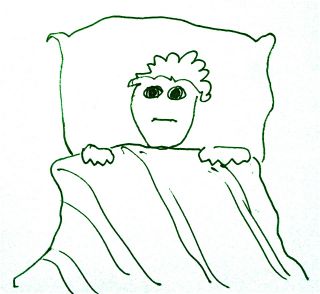
Sleep
Valerian for Sleep and Weaning Off Anxiety Medications
This ancient herb may help common insomnia and drug withdrawal issues.
Posted March 5, 2015 Reviewed by Ekua Hagan
Key points
- Valerian inhibits sympathetic nervous system neurons by enhancing levels of gamma-aminobutyric acid (GABA), a brain-calming neurotransmitter.
- One meta-analysis of 18 randomized controlled clinical trials suggests there is a benefit to using valerian for sleep.
- Valerian has also been shown to help patients stay asleep when trying to wean off anxiety medications.

When dealing with anxiety, sleep is often a major part of why emotions get worse, or cannot get better.
For my patients with insomnia, I look at a number of factors that can contribute to this. These often include hormonal imbalances, stress hormones like cortisol that can be too high, blood sugar issues, and sleep hygiene challenges. Neurotransmitter imbalances and nutrient deficiencies may also play a role in keeping us too wired to sleep. Lack of exercise can be a factor. Of course, being stressed out can drive this as well. It is extremely important to look at these physiologic and lifestyle factors in order to help work with the underlying causes.
Valerian for Sleep
While working on the underlying factors of sleep, valerian is an herbal medicine that stands out as a great soporific support to help people with insomnia get some shut-eye sooner. In fact, valerian is the most well-studied herbal medicine for sleep.
The root word “valere” comes from the Latin term “good health” and has a long history of helping various conditions. One of my teachers, Dr. Bill Mitchell, used to rub valerian oil on sore muscles during long hikes. Native Americans used valerian as a chewed poultice (plant material applied to the body) for earaches, and also as a poultice for seizures in babies (Mtichell, 2003).
Valerian was recognized by Hippocrates (the father of medicine) and used by Galen for insomnia. Valerian is especially helpful for people who focus stress in their gut, ("the nervous stomach") and when there is a strong anxiety component accompanying someone’s inability to sleep. It can also help mildly lower blood pressure and works well when blood pressure spikes accompany sleeplessness.
This herb has constituents that act to inhibit sympathetic nervous system neurons by enhancing levels of gamma-aminobutyric acid (GABA), a brain-calming neurotransmitter. The sympathetic nervous system activates the stress response in our body. This response is sometimes called the "flight or flight" response and is the one responsible for feeling that you have to fight or run away from danger.
A meta-analysis is a study of many studies and is considered by some experts to be the most reliable way to decide whether a particular drug or remedy might be effective. One meta-analysis of 18 randomized controlled clinical trials suggests there is a benefit to using valerian for sleep (Fernández-San-Martín et al., 2010).
In one randomized, triple-blind, controlled trial of 100 post-menopausal women, valerian showed better sleep quality when the women were given either 530 mg of concentrated valerian extract or a placebo twice a day for 4 weeks. While most studies do report positive effects, one randomized trial did not find benefit, although this study was in a small group of 16 women. This particular study used very low doses — 300mg once a day before bed (Taibi et al., 2009). It is possible using the higher doses typically recommended may have shown a benefit.
Valerian to Help Wean Off Medications?
While anxiety medications are helpful to help temporarily feel calm and fall asleep, they are addictive, and often difficult to get off of due to withdrawal problems. Anxiety drugs also increase the risk of death overall (see my July 2011 Psychology Today blog post for more on that) and is a reason I like to support my patients to stop using them when possible. Valerian has been shown helpful to get off these meds and I have seen it work in my own practice.
Often when people try to stop taking anti-anxiety medications, they have a rebound waking effect, where they stop sleeping throughout the night. Valerian has been shown to help patients stay asleep when trying to wean off anxiety medications. In rat studies, valerian had been shown to help alleviate withdrawal syndromes resulting from discontinuing diazepam (Valium) following long-term use (Andreatini and Leite, 1994). Valerian has also been shown not to have any toxic effects in the process (Tufik et al., 1994).
A team out of Brazil working with humans found similar results when they prescribed valerian (100mg three times a day, with 80% didrovaltrate, 15% valtrate, and 5% acelvaltrate from valerian root) to help patients with insomnia tolerate the withdrawal from benzodiazepines.
These 19 patients (average age of 43) were using benzodiazepines every night for an average of 7 years but still had poor sleep. Matched to 18 control group subjects, EEG (electroencephalogram — a way to look at brain activity during sleep) patterns were studied during sleep while still on the benzodiazepines, and then for 2 weeks after while taking either valerian or placebo.
The patients taking the valerian reported significantly better subjective sleep quality than those on placebo after benzodiazepine withdrawal, despite the presence of a few withdrawal side effects from the medications. At the end of two weeks, there was a significant decrease in nighttime waking time after sleep onset in valerian subjects when compared to placebo subjects.
While valerian is helpful, it may not be perfect in its effect: Valerian-treated patients did show more difficulty falling asleep longer as well as taking longer to fall asleep than the control subjects. Despite subjective improvement, sleep data showed that valerian did not actually produce faster sleep onset, which was likely due to the withdrawal hyperarousal of the medication.
Overall though, the researchers concluded that valerian was well-tolerated, and had a positive effect on withdrawal benzodiazepine use, with no interactions between the two (Poyares et al., 2002). It is a small study, so more studies need to be done to fully understand how to best use valerian to wean off anti-anxiety medications.
Dosage and Safety of Valerian
The typical dosage of valerian is 450 mg to 600mg, taken about two hours before bedtime. Patients with daily anxiety or needing more sleep support may add an early afternoon dose too. In most cases, valerian works best when taken over a few weeks versus at night when needed. While safety has been shown in trials of adults, children (Francis and Dempster, et al., 2002), and in the senior population, it has not been evaluated in pregnancy or breastfeeding.
Please note, valium, the common benzodiazepine drug, is not derived from valerian. Because the active components of valerian may increase benzodiazepine (Xanax, Valium, Klonopin, and Ativan) activity, I would recommend working with a physician who is knowledgeable about drug and herbal interaction before using valerian with these medications.
References
Andreatini R, Leite JR. Effect of valepotriates on the behaviour of rats on the elevated plus maze during benzodiazepine withdrawal. Eur. J. Pharmacol., 260 (1994), pp. 233–235
Fernández-San-Martín MI, Masa-Font R, Palacios-Soler L, Sancho-Gómez P, Calbó-Caldentey C, Flores-Mateo G. Effectiveness of Valerian on insomnia: a meta-analysis of randomized placebo-controlled trials. Sleep Med. 2010 Jun;11(6):505-11.
Francis A.J., Dempster R.J. Effect of valerian, Valeriana edulis, on sleep difficulties in children with intellectual deficits: randomised trial Phytomedicine, 9 (4) (2002):273–279.
Mitchell B. Plant Medicine in Practice: Using the Techniques of Dr. John Bastyr. Churchill Livingstone. St. Louis. 2003. P 344.
Poyares DR, Guilleminault C, Ohayon MM, Tufik S. Can valerian improve the sleep of insomniacs after benzodiazepine withdrawal? Prog Neuropsychopharmacol Biol Psychiatry. 2002 Apr;26(3):539-45.
Taibi DM, Vitiello MV, Barsness S, Elmer GW, Anderson GD, Landis CA. A randomized clinical trial of valerian fails to improve self-reported, polysomnographic, and actigraphic sleep in older women with insomnia. Sleep Med. 2009 Mar;10(3):319-28.
Tufik S, Fujita K, Seabra M.L.V, Lobo L.L. Effects of a prolonged administration of valepotriates in rats on the mother and their offspring J. Ethnopharmacol., 41 (1994): 39–44



